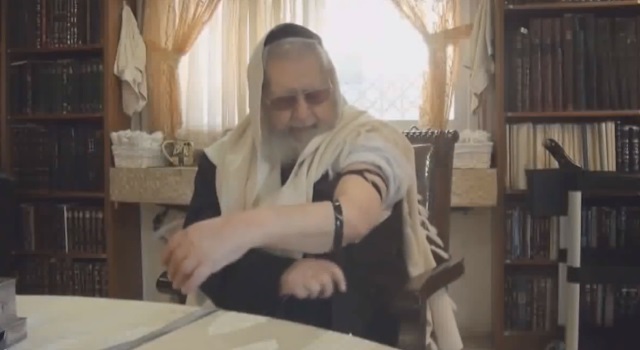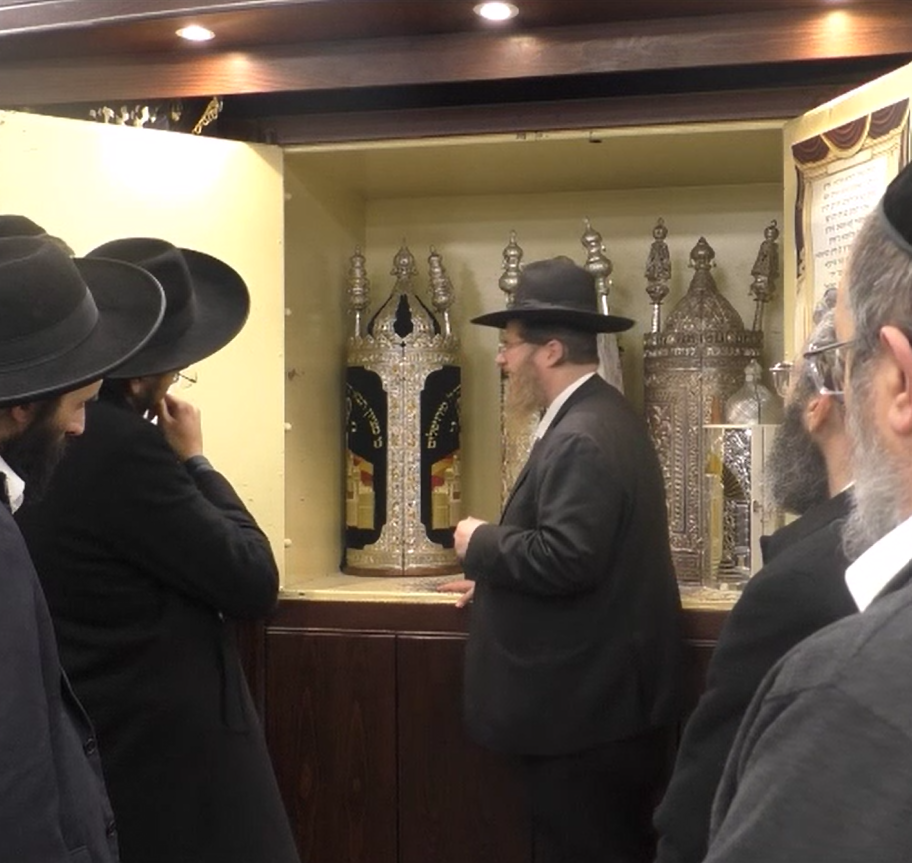The time of hanachat Tefillin:
In the morning starting an hour earlier before the ‘netz hachma’ time is allowed, and it is permitted to be ‘manich tefillin’ all day until sundown. Although from sundown onwards untill the next morning, one must not were because Fearing that he will sleep and inflict with them and the tefillin will come contempt.
Tefillin of yad:
One should be ‘maniach’ The ‘tefillin’ on his weak hand, most people that are righties should but the tefillin on the left hand, but a ‘lefty’ (“iter) who does all his work with his left hand and also writes, will place the tefillin on his right hand, and if he controls both hands equally, he shall place on the left of every person.
Caution from a hatzitzah:
Lift the sleeve that there will be no ‘hatzitzah’ between the tefillin to your hand, and if there is a Band-Aid or bandage and can be removed, it must be removed and especially where the bait of the tefillin is placed and the binding that should be more careful of any ‘hatzitzah’, but the place of the bindings around the arm with the straps, it is not necessary to be careful of a ‘hatzitzah’.
Align the tefillin strip first and make sure it is not curved or upside down.
Exact place of ‘hanacha’ of yad:
In the arm – the upper wrist [above the elbow], on the swollen place of the muscle on the arm, and the whole swollen place is the place of placing the tefillin of a hand, and be careful that the end of the bait of tefillin will not be placed down with in two fingers (4 cm) from the beginning of the arm joint.
Direct tefillin towards the heart, meaning that the bait of tefillin will be tilted and pulled to the side of the heart.
First, you assumed that some used to say “leshaim yichud” presented in the ‘sidurim’.

Then first the tightening one will bless:
בָּרוּךְ אַתָּה יְיָ אֱלֹהֵינוּ מֶלֶךְ הָעוֹלָם אֲשֶׁר קִדְּשָׁנוּ בְּמִצְוֹתָיו וְצִוָּנוּ לְהָנִיחַ תְּפִלִּין.
Immediately afterwards, he will tighten the straps and not speak even in the case of answering ‘amen’ until he finishes placing ‘tefillin’ of his head.
And then rap the straps seven times on his arm.

Tefillin shel rosh:
Immediately afterwards, one shall place ‘tefillin shel rosh’, without a blessing.
Location of ‘Tefillin shel rosh’:
The ligament bond will be on the back of the brainstem, above the middle of the neck but under the skull. The bait of the tefillin themselves will be placed against the eyes above the forehead.
Be careful that the end of the bait will be at the beginning of the hair growth, and be careful that the ‘tefillin’ will not be on the forehead even a little bit.
If you have a mirror in front of you, it is recommended to check that the ‘tefillin’ is indeed located between the eyes.
After completing putting the ‘tefillin’ on your head, one should strip the straps on his hand will bind three bindings around the middle finger, one up and two covers in the bottom layer, and some say standing:
וְאֵרַשְׂתִּיךְ לִי לְעוֹלָם וְאֵרַשְׂתִּיךְ לִי בְּצֶדֶק וּבְמִשְׁפָּט וּבְחֶסֶד וּבְרַחֲמִים וְאֵרַשְׂתִּיךְ לִי בֶּאֱמוּנָה וְיָדַעַתְּ אֶת יְהוָה.
Then, wrap the rest of the strap on your palm, so that it does not interfere while the prayer.
If you have spoken between placing the tefillin of yad and placing the tefillin of rosh, one should be blessed again:
”בָּרוּךְ אַתָּה ה’ אֱלֹהֵינוּ מֶלֶךְ הָעוֹלָם. אֲשֶׁר קִדְּשָׁנוּ בְּמִצְוֹתָיו וְצִוָּנוּ לְהָנִיחַ תְּפִלִּין.”
After placing tefillin of your head, make sure that the shiny black side of the right and left straps tilts outwards and does not flip over. You can strengthen the straps with a belt, or simply check occasionally when placing the tefillin that the straps are placed on the correct side.
Be careful and say with the tefillin these parshiot:
שְמַע יִשְׁרָאֵל, יי אֱ־לֹהֵינוּ יי אֶחָד.
בלחש: בָּרוּךְ שֵׁם כְּבוֹד מַלְכוּתוֹ, לְעוֹלָם וָעֶד.
וְאָהַבְתָּ אֵת יי אֱ־לֹהֶיךָ, בְּכָל לְבָבְךָ וּבְכָל נַפְשְׁךָ וּבְכָל מְאֹדֶךָ. וְהָיוּ הַדְּבָרִים הָאֵלֶּה אֲשֶֹר אָנֹכִי מְצַוְּךָ הַיּוֹם עַל לְבָבֶךָ. וְשׁנַּנְתָּם לְבָנֶיךָ וְדִבַּרְתָּ בָּם, בְּשִׁבְתְּךָ בְּבֵיתֶךָ וּבְלֶכְתְּךָ בַדֶּרֶךְ וּבְשָׁכְבְּךָ וּבְקוּמֶךָ. וּקְשַׁרְתָּם לְאוֹת עַל יָדֶךָ, וְהָיוּ לְטֹטָפֹת בֵּין עֵינֶיךָ. וּכְתַבְתָּם עַל מְזֻזוֹת בֵּיתֶךָ וּבִשְׁעָרֶיךָ.
וְהָיָה אִם שָׁמֹעַ תִּשְׁמְעוּ אֶל מִצְוֹתַי אֲשֶׁר אָנֹכִי מְצַוֶּה אֶתְכֶם הַיּוֹם, לְאַהֲבָה אֶת יי אֱ־לֹהֵיכֶם וּלְעָבְדוֹ בְּכָל לְבַבְכֶם וּבְכָל נַפְשְׁכֶם. וְנָתַתִּי מְטַר אַרְצְכֶם בְּעִתּוֹ יוֹרֶה וּמַלְקוֹשׁ, וְאָסַפְתָּ דְגָנֶךָ וְתִירשְׁךָ וְיִצְהָרֶךָ. וְנָתַתִּי עֵשֶׂב בְּשָֹדְךָ לִבְהֶמְתֶּךָ, וְאָכַלְתָּ וְשָֹבָעְתָּ. הִשָּׁמְרוּ לָכֶם פֶּן יִפְתֶּה לְבַבְכֶם, וְסַרְתֶּם וַעֲבַדְתֶּם אֱלֹהִים אֲחֵרִים וְהִשְׁתַּחֲוִיתֶם לָהֶם. וְחָרָה אַף יי בָּכֶם וְעָצַר אֶת הַשָּׁמַיִם וְלֹא יִהְיֶה מָטָר וְהָאֲדָמָה לֹא תִתֵּן אֶת יְבוּלָהּ, וַאֲבַדְתֶּם מְהֵרָה מֵעַל הָאָרֶץ הַטֹּבָה אֲשֶׁר יי נֹתֵן לָכֶם. וְשַֹמְתֶּם אֶת דְּבָרַי אֵלֶּה עַל לְבַבְכֶם וְעַל נַפְשְׁכֶם, וּקְשַׁרְתֶּם אֹתָם לְאוֹת עַל יֶדְכֶם וְהָיוּ לְטוֹטָפֹת בֵּין עֵינֵיכֶם. וְלִמַּדְתֶּם אֹתָם אֶת בְּנֵיכֶם לְדַבֵּר בָּם, בְּשִׁבְתְּךָ בְּבֵיתֶךָ וּבְלֶכְתְּךָ בַדֶּרֶךְ וּבְשָׁכְבְּךָ וּבְקוּמֶךָ. וּכְתַבְתָּם עַל מְזוּזוֹת בֵּיתֶךָ וּבִשְׁעָרֶיךָ. לְמַעַן יִרְבּוּ יְמֵיכֶם וִימֵי בְנֵיכֶם עַל הָאֲדָמָה אֲשֶׁר נִשְׁבַּע יי לַאֲבֹתֵיכֶם לָתֵת לָהֶם, כִּימֵי הַשָּׁמַיִם עַל הָאָרֶץ.
וַיֹּאמֶר יי אֶל משֶׁה לֵּאמֹר. דַּבֵּר אֶל בְּנֵי יִשְׂרָאֵל וְאָמַרְתָּ אֲלֵהֶם וְעָשׂוּ לָהֶם צִיצִת עַל כַּנְפֵי בִגְדֵיהֶם לְדֹרֹתָם, וְנָתְנוּ עַל צִיצִת הַכָּנָף פְּתִיל תְּכֵלֶת. וְהָיָה לָכֶם לְצִיצִת וּרְאִיתֶם אֹתוֹ וּזְכַרְתֶּם אֶת כָּל מִצְוֹת יי וַעֲשִׂיתֶם אֹתָם, וְלֹא תָתוּרוּ אַחֲרֵי לְבַבְכֶם וְאַחֲרֵי עֵינֵיכֶם אֲשֶׁר אַתֶּם זֹנִים אַחֲרֵיהֶם. לְמַעַן תִּזְכְּרוּ וַעֲשִׂיתֶם אֶת כָּל מִצְוֹתָי וִהְיִיתֶם קְדשִׁים לֵא־לֹהֵיכֶם. אֲנִי יי אֱ־לֹהֵיכֶם אֲשֶׁר הוֹצֵאתִי אֶתְכֶם מֵאֶרֶץ מִצְרַיִם לִהְיוֹת לָכֶם לֵא־לֹהִים אֲנִי יי אֱ־לֹהֵיכֶם. אֱמֶת.
ויְדַבֵּר יְהוָה אֶל מֹשֶׁה לֵּאמֹר: קַדֶּשׁ לִי כָל בְּכוֹר פֶּטֶר כָּל רֶחֶם בִּבְנֵי יִשְׂרָאֵל בָּאָדָם וּבַבְּהֵמָה לִי הוּא: וַיֹּאמֶר מֹשֶׁה אֶל הָעָם זָכוֹר אֶת הַיּוֹם הַזֶּה אֲשֶׁר יְצָאתֶם מִמִּצְרַיִם מִבֵּית עֲבָדִים כִּי בְּחֹזֶק יָד הוֹצִיא יְהֹוָה אֶתְכֶם מִזֶּה וְלֹא יֵאָכֵל חָמֵץ: הַיּוֹם אַתֶּם יֹצְאִים בְּחֹדֶשׁ הָאָבִיב: וְהָיָה כִי יְבִיאֲךָ יְהוָה אֶל אֶרֶץ הַכְּנַעֲנִי וְהַחִתִּי וְהָאֱמֹרִי וְהַחִוִּי וְהַיְבוּסִי אֲשֶׁר נִשְׁבַּע לַאֲבֹתֶיךָ לָתֶת לָךְ אֶרֶץ זָבַת חָלָב וּדְבָשׁ וְעָבַדְתָּ אֶת הָעֲבֹדָה הַזֹּאת בַּחֹדֶשׁ הַזֶּה: שִׁבְעַת יָמִים תֹּאכַל מַצֹּת וּבַיּוֹם הַשְּׁבִיעִי חַג לַיהוָה: מַצּוֹת יֵאָכֵל אֵת שִׁבְעַת הַיָּמִים וְלֹא יֵרָאֶה לְךָ חָמֵץ וְלֹא יֵרָאֶה לְךָ שְׂאֹר בְּכָל גְּבֻלֶךָ: וְהִגַּדְתָּ לְבִנְךָ בַּיּוֹם הַהוּא לֵאמֹר בַּעֲבוּר זֶה עָשָׂה יְהוָה לִי בְּצֵאתִי מִמִּצְרָיִם: וְהָיָה לְךָ לְאוֹת עַל יָדְךָ וּלְזִכָּרוֹן בֵּין עֵינֶיךָ לְמַעַן תִּהְיֶה תּוֹרַת יְהוָה בְּפִיךָ כִּי בְּיָד חֲזָקָה הוֹצִאֲךָ יְהֹוָה מִמִּצְרָיִם: וְשָׁמַרְתָּ אֶת הַחֻקָּה הַזֹּאת לְמוֹעֲדָהּ מִיָּמִים יָמִימָה (שמות י”ג, א’-י’).
וְהָיָה כִּי יְבִאֲךָ יְהוָה אֶל אֶרֶץ הַכְּנַעֲנִי כַּאֲשֶׁר נִשְׁבַּע לְךָ וְלַאֲבֹתֶיךָ וּנְתָנָהּ לָךְ: וְהַעֲבַרְתָּ כָל פֶּטֶר רֶחֶם לַיהֹוָה וְכָל פֶּטֶר שֶׁגֶר בְּהֵמָה אֲשֶׁר יִהְיֶה לְךָ הַזְּכָרִים לַיהוָה: וְכָל פֶּטֶר חֲמֹר תִּפְדֶּה בְשֶׂה וְאִם לֹא תִפְדֶּה וַעֲרַפְתּוֹ וְכֹל בְּכוֹר אָדָם בְּבָנֶיךָ תִּפְדֶּה: וְהָיָה כִּי יִשְׁאָלְךָ בִנְךָ מָחָר לֵאמֹר מַה זֹּאת וְאָמַרְתָּ אֵלָיו בְּחֹזֶק יָד הוֹצִיאָנוּ יְהוָה מִמִּצְרַיִם מִבֵּית עֲבָדִים: וַיְהִי כִּי הִקְשָׁה פַרְעֹה לְשַׁלְּחֵנוּ וַיַּהֲרֹג יְהֹוָה כָּל בְּכוֹר בְּאֶרֶץ מִצְרַיִם מִבְּכֹר אָדָם וְעַד בְּכוֹר בְּהֵמָה עַל כֵּן אֲנִי זֹבֵחַ לַיהוָה כָּל פֶּטֶר רֶחֶם הַזְּכָרִים וְכָל בְּכוֹר בָּנַי אֶפְדֶּה: וְהָיָה לְאוֹת עַל יָדְכָה וּלְטוֹטָפֹת בֵּין עֵינֶיךָ כִּי בְּחֹזֶק יָד הוֹצִיאָנוּ יְהוָה מִמִּצְרָיִם (שמות י”ג, י”א-ט”ז).
What do they say with ‘tefillin’?
When one is saying ‘kiriat shama’ and ‘amida’, you are makayam mitzvat ‘Tefillin’ and ‘tefilla’. But if you are short on time and in a rush, you can read parashat Shema Yisrael.
The essence of the mitzva:
The mitzva of tefillin commandment applies to every Jew over the age of 13 – the age of the mitzvahs. And from education law they should be accustomed to a year or two earlier, only if the child knows how to keep his body in purity.
The mitzva is mentioned several times in the Torah, and it is considered very sacred. By placing Tefillin, which must be held every day of the week except for Sabbaths and holidays, we connect with hashem. There are also people who do not define themselves as religious guardians and still tend to put tefillin every day, because this is an opportunity for them to say thank you to the Creator of the world and connect with the spiritual sides of them and say a prayer that will help them to have a good and happy life.
